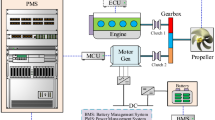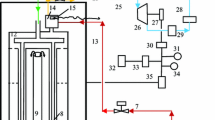Abstract
Natural gas has been widely used in transportation and power generation due to its abundant reserves and high efficiency and cleanliness. However, the natural gas engines used to power ships have problems such as slow dynamic response and high gas consumption at low loads. Gas-electric hybrid systems are used in the field of marine hybrid power to investigate the superiority of response performance compared to the natural gas engine. A parallel hybrid power system simulation model was established using the idea of modular modeling. The marine hybrid power system mode switching control strategy was designed and verified by simulation. The tests were carried out on a test stand. The results show that the combined driving method of natural gas engine and permanent magnet synchronous motor can achieve dynamic compensation and shorten dynamic response time of natural gas engine during transient process. It can make the natural gas engine always run in the high efficiency zone under different working conditions. The results of the research are instructive for the selection and matching, design and optimization of energy management system about marine gas-electric hybrid power.


















Similar content being viewed by others
References
Y.P. Yuan, J.X. Wang, X.P. Yan, A review of multi-energy hybrid power system for ships. Renew. Sustain. Energy Rev. 132, 110081 (2020). https://doi.org/10.1016/j.rser.2020.110081
P. Pan, Y. Sun, C. Yuan, X. Yan, X. Tang, Research progress on ship power systems integrated with new energy sources: a review. Renew. Sustain. Energy Rev. 144, 111048 (2021). https://doi.org/10.1016/j.rser.2021.111048
K. Luo, Y. Huang, Z. Han, Y. Li, Y. Shi, W. Liu, C. Tang, Low-speed performance compensation of a turbocharged natural gas engine by intake strategy optimization. Fuel 324, 124748 (2022). https://doi.org/10.1016/j.fuel.2022.124748
F.D. Kanellos, J.M. Prousalidis, G.J. Tsekouras, Control system for fuel consumption minimization-gas emission limitation of full electric propulsion ship power systems. Proc. Inst. Mech. Eng. Part M J. Eng. Marit. Environ. 228(1), 17–28 (2014). https://doi.org/10.1177/1475090212466523
C. Nuchturee, T. Li, H. **a, Energy efficiency of integrated electric propulsion for ships–a review. Renew. Sustain. Energy Rev. 134, 110145 (2020). https://doi.org/10.1016/j.rser.2020.110145
J.J. de Troya, C. Alvarez, C. Fernández-Garrido, L. Carral, Analysing the possibilities of using fuel cells in ships. Int. J. Hydrog. Energy 41(4), 2853–2866 (2016). https://doi.org/10.1016/j.ijhydene.2015.11.145
B.A. Kumar, R. Selvaraj, T.R. Chelliah et al., Improved fuel-use efficiency in diesel-electric tugboats with an asynchronous power generating unit. IEEE. Trans. Transp. Electrif. 5(2), 565–578 (2019). https://doi.org/10.1109/TTE.2019.2906587
S. Minami, T. Toki, N. Yoshikawa et al., A newly developed plug-in hybrid electric boat (PHEB). J. Asian Electr. Veh. 8(1), 1385–1392 (2010). https://doi.org/10.4130/jaev.8.1385
R.D. Geertsma, R.R. Negenborn, K. Visser et al., Design and control of hybrid power and propulsion systems for smart ships: a review of developments. Appl. Energy 194, 30–54 (2017). https://doi.org/10.1016/j.apenergy.2017.02.060
M. Tadros, M. Ventura, C.G. Soares, A nonlinear optimization tool to simulate a marine propulsion system for ship conceptual design-sciencedirect. Ocean Eng. 210, 107417 (2020). https://doi.org/10.1016/j.oceaneng.2020.107417
X. Sun, C. Yao, E. Song et al., Research on matching and selection of new type of marine gas-electric hybrid power system. J. Inst. Eng. India Ser. C 103(3), 473–483 (2022). https://doi.org/10.1007/s40032-021-00757-w
E. Ovrum, T.F. Bergh, Modelling lithium-ion battery hybrid ship crane operation. Appl. Energy 152, 162–172 (2015). https://doi.org/10.1016/j.apenergy.2015.01.066
C. Capasso, E. Notti, O. Veneri, Design of a hybrid propulsion architecture for midsize boats. Energy Procedia 158, 2954–2959 (2019). https://doi.org/10.1016/j.egypro.2019.01.958
X.I.A. **gting, L.I. Shaohai, L.A.I. Chen, Design of ship diesel-electric parallel hybrid system. Ship Eng. (2019). https://doi.org/10.13788/j.cnki.cbgc.2019.05.08
Y. Yuan, J. Wang, X. Yan, Q. Li, T. Long, A design and experimental investigation of a large-scale solar energy/diesel generator powered hybrid ship. Energy 165, 965–978 (2018). https://doi.org/10.1016/j.energy.2018.09.085
X. Sun, C. Yao, E. Song, Q. Yang, X. Yang, Optimal control of transient processes in marine hybrid propulsion systems: modeling, optimization and performance enhancement. Appl. Energy 321, 119404 (2022). https://doi.org/10.1016/j.apenergy.2022.119404
X.J. Sun, E.Z. Song, C. Yao et al., Optimal energy allocation of ship parallel gas electric hybrid power system based on fuzzy logic reasoning. J. Propuls. Technol. 43(06), 397–409 (2022). https://doi.org/10.13675/j.cnki.tjjs.210062
A. Gangopadhyay, P.H. Meckl, Extracting physical parameters from system identification of a natural gas engine. IEEE Trans. Control Syst. Tech. 9(3), 425–434 (2001). https://doi.org/10.1109/87.918896
S. Tavakoli, S. Saettone, S. Steen et al., Modeling and analysis of performance and emissions of marine lean-burn natural gas engine propulsion in waves. Appl. Energy 279, 115904 (2020). https://doi.org/10.1016/j.apenergy.2020.115904
F. Liyun, L. Yaowen, S. Haonan et al., Energy saving evaluation of ship single-shaft parallel gas-eletric hybrid system. J. Harbin Eng. Univ. 40(7), 1277–1283 (2019). https://doi.org/10.11990/jheu.201806023
H. Fatoorehchi, M. Ehrhardt, Numerical and semi-numerical solutions of a modified Thévenin model for calculating terminal voltage of battery cells. J. Energy Storage 45, 103746 (2022). https://doi.org/10.1016/j.est.2021.103746
M. Godjevac, J. Drijver, L. De Vries, D. Stapersma, Evaluation of losses in maritime gearboxes. Proc. Inst. Mech. Eng. Part M J. Eng. Marit. Environ. 230, 623–638 (2016). https://doi.org/10.1177/1475090215613814
N. Planakis, G. Papalambrou, N. Kyrtatos, Ship energy management system development and experimental evaluation utilizing marine loading cycles based on machine learning techniques. Appl. Energy 307, 118085 (2022). https://doi.org/10.1016/j.apenergy.2021.118085
Acknowledgements
This work is supported by High-tech ship scientific research project (KY10300190077).
Funding
No funding was received for conducting this study.
Author information
Authors and Affiliations
Corresponding author
Ethics declarations
Conflict of Interest
The author has no conflict of interest.
Additional information
Publisher's Note
Springer Nature remains neutral with regard to jurisdictional claims in published maps and institutional affiliations.
Rights and permissions
Springer Nature or its licensor (e.g. a society or other partner) holds exclusive rights to this article under a publishing agreement with the author(s) or other rightsholder(s); author self-archiving of the accepted manuscript version of this article is solely governed by the terms of such publishing agreement and applicable law.
About this article
Cite this article
Sun, X., Yao, C., Song, E. et al. Analysis of Operating Characteristics for Marine Gas-Electric Hybrid Power System. J. Inst. Eng. India Ser. C 104, 1–13 (2023). https://doi.org/10.1007/s40032-022-00897-7
Received:
Accepted:
Published:
Issue Date:
DOI: https://doi.org/10.1007/s40032-022-00897-7




